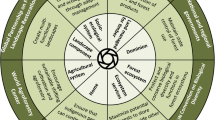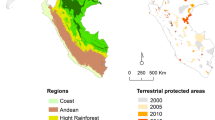Abstract
Various contrasts may be observed in the way three Pacific island countries — Papua New Guinea (PNG), Solomon Islands and Vanuatu — exploit their natural forest endowments. The modes of exploitation, the efficiency of forest revenue systems and the sustainability of forest allocation mechanisms are analysed. It is argued that equity issues are also important in forest policy given that forests in all three countries are under customary tenure. The forest revenue system in PNG is criticised for being inefficient and inequitable. In the Solomons the rate of logging is found to be unsustainable, being linked to the country’s economic crisis. In Vanuatu a logging ban has stimulated timber processing, but probably at a cost to the economy, and has failed to confer sustainability on the industry. Changes to forest revenue systems and forest allocation procedures that would enhance efficiency, equity, sustainability and conservation are identified, along with impediments to these changes.
Similar content being viewed by others
References
AusAID (1997), Economic Survey of Papua New Guinea, AusAID, Canberra.
AusAID (1999), The Economy of Papua New Guinea AusAID, Canberra.
Bank of Papua New Guinea (various years), Quarterly Economic Bulletin, Bank of Papua New Guinea, Port Moresby.
Bouro, G. (2001), Commissioner of Forests, Honiara, personal communication.
Central Bank of Solomon Islands (various years), Annual report, Central Bank of Solomon Islands, Honiara.
Duncan, R C. (1994), Melanesian Forestry Sector Study, Australian International Development Assistance Bureau, Canberra.
Everts, B. (2001), Forest Review Team: Auditing Forestry Projects Currently ‘In Process’ for Compliance with the requirements of the Policy, the Forestry Act and Other Regulations and Guidelines, World Bank, Washington, D.C.
Forest Industries Association (2001), A Statistical Profile of Key Indicators, Forest Industries Association, Port Moresby.
Fortech (1997), Marketing of PNG Forest Products, Milestone 2 Report, Logging and Processing Costs in Papua New Guinea, Fortech, Canberra.
Gerrand, A. (2001), Principal Forest Officer, Department of Forests, Port Vila, personal communication.
Government of Papua New Guinea (2001), ‘Draft review of the forest revenue system in Papua New Guinea’, Government of Papua New Guinea, Waigani.
Government of Vanuatu (2001), http://www.vanuatugovernment.gov.vu.
Hunt, C. (2000), ‘Revenue implications of export tax denomination in developing countries: the case of forestry in Papua New Guinea’, Economic Policy and Analysis, 30 (2): 175–187.
Hunt, C. (2001a), ‘Organisation of eco-forestry in PNG’, in J.L. Herbohn, S.R. Harrison, K.F. Herbohn and D.B. Smorfitt, eds., Developing Policies to Encourage Small-scale Forestry, Proceedings from an international symposium held in Kuranda, Australia, 9–13 January, 2000: 137–142.
Hunt, C. (2001b), ‘Marketing eco-timber in PNG’, in J.L. Herbohn, S.R. Harrison, K.F. Herbohn and D.B. Smorfitt, eds., Developing Policies to Encourage Small-scale Forestry, Proceedings from an international symposium held in Kuranda, Australia, 9–13 January, 2000: 150–156.
Hunt, C., ed. (2002a), Production, Privatisation and Preservation in Papua New Guinea Forestry, International Institute for Environment and Development, London, Monograph 38 National Research Institute, Port Moresby.
Hunt, C. (2002b), ‘Local and global benefits of subsidising tropical forest conservation’, Environment and Development Economics, 7(3): 325–340.
Hyde, W.F. and Sedjo, R.A. (1992), ‘Managing tropical forests: reflections on the rent distribution issue’, Land Economics, 68(3): 243–350.
Manning, M. (1999), ‘Beyond 1999-some uncertainty for Papua New Guinea?’, Pacific Economic Bulletin, (14)2: 12–24.
Ministry of Forests, Environment and Conservation (2001), ‘New developments in Solomon Islands log charges’, Ministry of Forest, Environment and Conservation, Honiara.
SGS PNG Ltd. (various years), Log exports monthly summary, SGS, Port Moresby.
Raymond, D. (2001), Training Adviser, Forestry Management Project, Honiara, personal communication.
Shearman, P. and Cannon, J. (2002), ‘PNG forest resources and the log export industry’, Papua New Guinea Eco-Forestry Forum, Boroko.
Sheehan, P. (2000), ‘The soloman Islands forests sector’, Pacific Economic Bulletin, 15(1): 126–131.
Stocker, G. (2002), ‘Substitution of government services to forestry by the private sector’, in C. Hunt, ed., Production, Privatisation and Preservation in Papua New Guinea Forestry, International Institute for Environment and Development, London/National Research Institute, Port Moresby, pp. 98–120.
Vanuatu Department of Forests (2000), Annual report 2000, Government of Vanuatu, Port Vila.
Vincent, J.R. (1990), ‘Rent capture and the feasibility of tropical forestry management’, Land Economics, 66(2): 212–223.
Author information
Authors and Affiliations
Rights and permissions
About this article
Cite this article
Hunt, C. Efficient and equitable forest rent capture in three pacific island nations: Opportunities and impediments in forest policy reform. Small-scale Forestry 1, 39–53 (2002). https://doi.org/10.1007/s11842-002-0004-0
Issue Date:
DOI: https://doi.org/10.1007/s11842-002-0004-0




